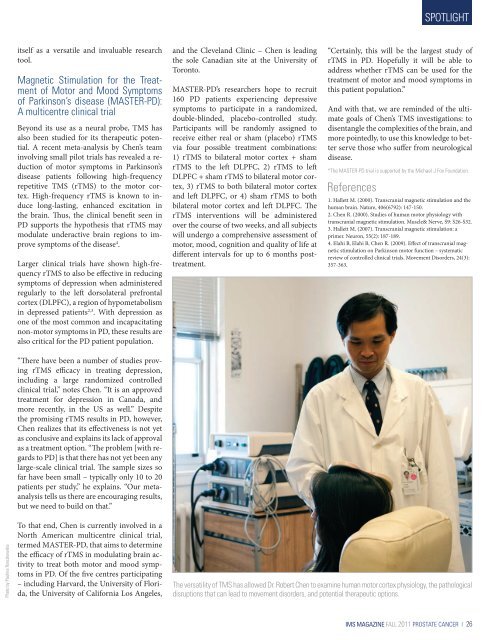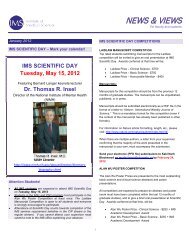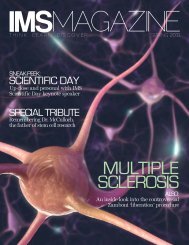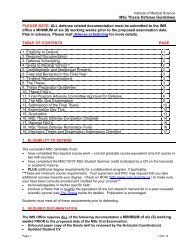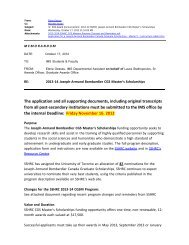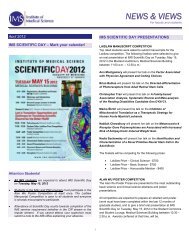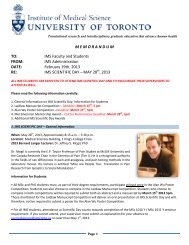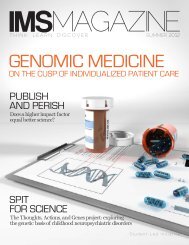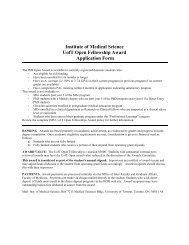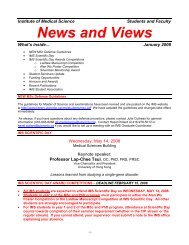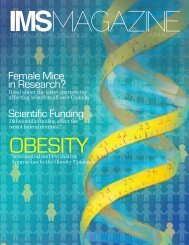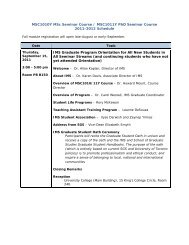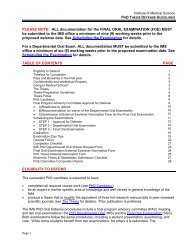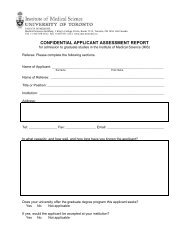Fall 2011 - Institute of Medical Science - University of Toronto
Fall 2011 - Institute of Medical Science - University of Toronto
Fall 2011 - Institute of Medical Science - University of Toronto
Create successful ePaper yourself
Turn your PDF publications into a flip-book with our unique Google optimized e-Paper software.
SPOTLIGHT<br />
itself as a versatile and invaluable research<br />
tool.<br />
Magnetic Stimulation for the Treatment<br />
<strong>of</strong> Motor and Mood Symptoms<br />
<strong>of</strong> Parkinson’s disease (MASTER-PD):<br />
A multicentre clinical trial<br />
Beyond its use as a neural probe, TMS has<br />
also been studied for its therapeutic potential.<br />
A recent meta-analysis by Chen’s team<br />
involving small pilot trials has revealed a reduction<br />
<strong>of</strong> motor symptoms in Parkinson’s<br />
disease patients following high-frequency<br />
repetitive TMS (rTMS) to the motor cortex.<br />
High-frequency rTMS is known to induce<br />
long-lasting, enhanced excitation in<br />
the brain. Thus, the clinical benefit seen in<br />
PD supports the hypothesis that rTMS may<br />
modulate underactive brain regions to improve<br />
symptoms <strong>of</strong> the disease 4 .<br />
Larger clinical trials have shown high-frequency<br />
rTMS to also be effective in reducing<br />
symptoms <strong>of</strong> depression when administered<br />
regularly to the left dorsolateral prefrontal<br />
cortex (DLPFC), a region <strong>of</strong> hypometabolism<br />
in depressed patients 2,3 . With depression as<br />
one <strong>of</strong> the most common and incapacitating<br />
non-motor symptoms in PD, these results are<br />
also critical for the PD patient population.<br />
“There have been a number <strong>of</strong> studies proving<br />
rTMS efficacy in treating depression,<br />
including a large randomized controlled<br />
clinical trial,” notes Chen. “It is an approved<br />
treatment for depression in Canada, and<br />
more recently, in the US as well.” Despite<br />
the promising rTMS results in PD, however,<br />
Chen realizes that its effectiveness is not yet<br />
as conclusive and explains its lack <strong>of</strong> approval<br />
as a treatment option. “The problem [with regards<br />
to PD] is that there has not yet been any<br />
large-scale clinical trial. The sample sizes so<br />
far have been small – typically only 10 to 20<br />
patients per study,” he explains. “Our metaanalysis<br />
tells us there are encouraging results,<br />
but we need to build on that.”<br />
and the Cleveland Clinic – Chen is leading<br />
the sole Canadian site at the <strong>University</strong> <strong>of</strong><br />
<strong>Toronto</strong>.<br />
MASTER-PD’s researchers hope to recruit<br />
160 PD patients experiencing depressive<br />
symptoms to participate in a randomized,<br />
double-blinded, placebo-controlled study.<br />
Participants will be randomly assigned to<br />
receive either real or sham (placebo) rTMS<br />
via four possible treatment combinations:<br />
1) rTMS to bilateral motor cortex + sham<br />
rTMS to the left DLPFC, 2) rTMS to left<br />
DLPFC + sham rTMS to bilateral motor cortex,<br />
3) rTMS to both bilateral motor cortex<br />
and left DLPFC, or 4) sham rTMS to both<br />
bilateral motor cortex and left DLPFC. The<br />
rTMS interventions will be administered<br />
over the course <strong>of</strong> two weeks, and all subjects<br />
will undergo a comprehensive assessment <strong>of</strong><br />
motor, mood, cognition and quality <strong>of</strong> life at<br />
different intervals for up to 6 months posttreatment.<br />
“Certainly, this will be the largest study <strong>of</strong><br />
rTMS in PD. Hopefully it will be able to<br />
address whether rTMS can be used for the<br />
treatment <strong>of</strong> motor and mood symptoms in<br />
this patient population.”<br />
And with that, we are reminded <strong>of</strong> the ultimate<br />
goals <strong>of</strong> Chen’s TMS investigations: to<br />
disentangle the complexities <strong>of</strong> the brain, and<br />
more pointedly, to use this knowledge to better<br />
serve those who suffer from neurological<br />
disease.<br />
*The MASTER-PD trial is supported by the Michael J Fox Foundation.<br />
References<br />
1. Hallett M. (2000). Transcranial magnetic stimulation and the<br />
human brain. Nature, 406(6792): 147-150.<br />
2. Chen R. (2000). Studies <strong>of</strong> human motor physiology with<br />
transcranial magnetic stimulation. Muscle& Nerve, S9: S26-S32.<br />
3. Hallett M. (2007). Transcranial magnetic stimulation: a<br />
primer. Neuron, 55(2): 187-189.<br />
4. Elahi B, Elahi B, Chen R. (2009). Effect <strong>of</strong> transcranial magnetic<br />
stimulation on Parkinson motor function – systematic<br />
review <strong>of</strong> controlled clinical trials. Movement Disorders, 24(3):<br />
357-363.<br />
Photo by Paulina Rzeczkowska<br />
To that end, Chen is currently involved in a<br />
North American multicentre clinical trial,<br />
termed MASTER-PD, that aims to determine<br />
the efficacy <strong>of</strong> rTMS in modulating brain activity<br />
to treat both motor and mood symptoms<br />
in PD. Of the five centres participating<br />
– including Harvard, the <strong>University</strong> <strong>of</strong> Florida,<br />
the <strong>University</strong> <strong>of</strong> California Los Angeles,<br />
The versatility <strong>of</strong> TMS has allowed Dr. Robert Chen to examine human motor cortex physiology, the pathological<br />
disruptions that can lead to movement disorders, and potential therapeutic options.<br />
IMS MAGAZINE FALL <strong>2011</strong> PROSTATE CANCER | 26


